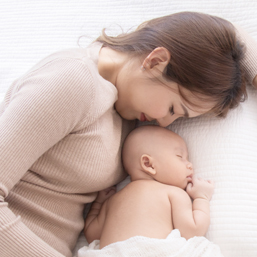
Postpartum depression occurs in one in ten parents who have just given birth. It also occurs in one in ten of their partners. Often, postpartum depression is left undiagnosed or not seen by a doctor, so the reality is that these numbers are probably higher. For that reason, it is so important to understand and recognize the signs and symptoms of postpartum depression either in yourself or in your partner.
Contributing factors to postpartum depression
There are many factors that play into the likelihood of experiencing postpartum depression. These factors include:
It is not unusual to experience big emotional responses in the first couple weeks following having a baby! It is also no surprise that the first several weeks after having a new baby can be exhausting. You will experience broken and unpredictable sleep patterns, which over time will create symptoms of exhaustion. That is why it is often difficult to detect symptoms of postpartum depression.
These more usual symptoms – often called “baby blues” – include trouble sleeping, change in appetite, lack of energy, and frequent mood changes. These symptoms often dissipate over the course of a couple weeks as your hormones regulate, your sleep habits improve and you get accustomed to your new lifestyle with your baby.
However, it is important to know the difference and additional symptoms common in parents experiencing something beyond the regular “baby blues” so they can get help.
Common symptoms of postpartum depression include:
If you have determined that you or your partner are suffering from postpartum depression, here are some suggestions to start the healing process:
Ways to encourage bonding in parents with postpartum depression
Disinterest or bonding issues with a new baby is something that is not talked about often enough.
Some parents feel connected and fall in love with their baby in pregnancy, and some do the moment they are born. Others can take longer - sometimes weeks or even months - to truly feel that they are connected and in love with their baby.
We often assume or expect that new parents should feel an instant connection to their new baby. If we don’t, we feel guilty or that we have failed in some way. But this delayed bonding is more common than we realize, and can happen to anyone! It’s even more likely if you had a difficult or traumatic pregnancy or birth experience, and it is also more likely if you are experiencing postpartum depression.
Why does it matter if you take time to bond with your baby? Studies have shown that impaired bonding can impact a child’s emotional, cognitive and behavioral long-term development. In other words, effective bonding with your new baby is vital for their long-term development.
So, although it is totally normal – especially in parents that either had a difficult labor experience, a painful recovery, or symptoms of postpartum depression - to have difficulties bonding with their new baby, it is also important to have tools to try and help facilitate bonding in these circumstances.
Here are some important suggestions to help you bond with your new baby:
By consciously and mindfully incorporating these activities into your daily routine with your new baby, you are going to create opportunities to find ways to connect and bond with them. With each effort you make, you are investing into your relationship with your child and positively impacting their development. This is definitely worth the investment for you both, even when it’s a struggle.
Knowing the signs and symptoms of postpartum depression and recognizing them in yourself or your partner is the first step in finding ways to overcome it. Knowing it is normal and not your fault is the next step. Once you have done that, you can continue to take steps using the suggestions in this article to help you find ways to bond with your baby, even if it’s just a little at a time. Be patient with yourself and with your partner. Try to encourage each other to do the things necessary to get better, even when it is hard. Find the community in your friends, family and professionals that can be a part of building you up and helping you move forward.
You are not alone!
Sharon Loose, CCE, CD, BDT, PCD, is a certified doula and childbirth educator with over 23 years’ experience and has supported over 1,500 Calgary and area families on their parenthood journey. She is the owner of Calgary Birth Essentials, which offers private and small group prenatal classes, birth and postpartum doula support, and breastfeeding and early parenting education. For more information, email This email address is being protected from spambots. You need JavaScript enabled to view it. or visit calgarybirthessentials.com.
See our related articles
Calgary’s Child Magazine © 2024 Calgary’s Child